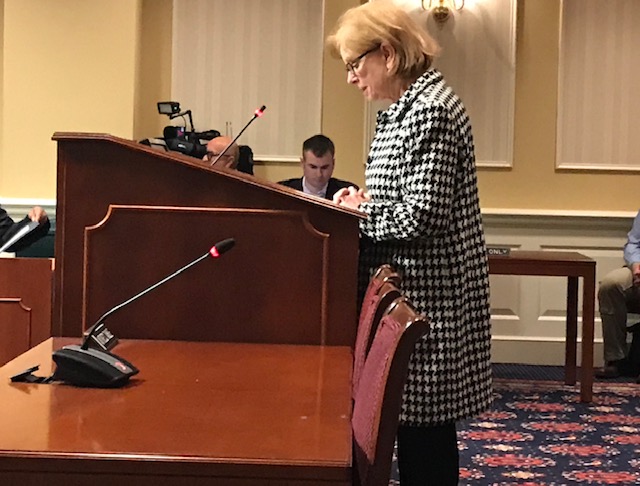Sen. Katherine Klausmeier, D-Baltimore County, emphasized to a panel of Maryland lawmakers on Thursday the need for legislation that would allow the use of distracted- driving monitoring systems on highways throughout the state.
“The problem of distracted driving is not new to any of us. The General Assembly has passed various pieces of legislation to address this issue. However, with the limited resources that law enforcement has — it can be extremely difficult to enforce these laws. So, therefore. we still see continually people on their cellphones texting, talking and —very distracted,” Klausmeier said at Senate Judicial Proceedings Committee hearing in Annapolis.
“This legislation allows state and local enforcement to use distracted-driving monitoring systems to assist in enforcing distracted-driving laws. The legislation also sets parameters for using the systems — including obtaining permission from local governing bodies and setting standards for how the information obtained by a camera can be used in court.”
The National Highway Traffic Safety Administration estimates that 3,166 people were killed by distracted driving in 2017 and that nine percent of all the crashes that year were caused by distracted driving, Klausmeier said. She said those statistics are proof that further action is needed to deter distracted driving.
“We must do whatever we can to ensure the safety of all Marylanders on the roadway and this legislation will take a large step in doing just that.”
John Pica, who represents Drive Safe Enforcement LLC, said the legislation is probably the most important bill lawmakers will consider this session. He described some of the safeguards contained in the legislation.
“First of all, its enabling legislation — it’s not mandatory. It allows a county to implement whatever technology they choose to better enforce distracted driving laws. This is specifically for talking and texting on the phone while driving. And in each county — or the state police — a program can only be implemented after a public hearing.”
Pica said that over the past five years, an estimated 26,500 people have been injured due to people who talked on their cellphone or texted while driving. Pica said on average for each of those years, 170 people have been killed by drivers who were using their phone to talking or texting. Pica said talking and texting behind the wheel is a big problem among teenagers.
“Today talking and texting on the phone is the leading cause of deaths among teenagers. It’s now surpassed crashes caused by driving while impaired by alcohol. As soon as you reach for your phone…you increase the percentage of an accident by 700 percent.
“If you start to text on your phone, the likelihood of an accident increases by 23 times.”
Jennifer Weaver fought back tears as she relayed that on Dec. 22, 2015 in Charles County she was the “at-fault” driver in a distracted-driving accident that resulted in the death of another driver. Weaver, who is now a driving safety advocate, said investigators determined that she had looked down at her phone prior to rear-ending the other car. The car was pushed into oncoming traffic.
“The occupant was pronounced deceased at the scene. A loved one was lost that day. A wonderful vital member of a family no longer walks this earth because of me and my poor decision. So many tragic consequences come to bear because I took my eyes off the road for five seconds.”
The legislation, SB819, would authorize “certain agencies to place distracted-driver monitoring systems on certain highways under certain circumstances,” according to its text. It would require that “a recorded image made by a distracted-driver monitoring system include two or more photographs, microphotographs, or electronic images or videotape, or other medium as well as clear identification of the registration plate number.” It would provide that the “owner or driver of a motor vehicle recorded committing a certain violation is subject to a civil penalty not to exceed $500.”
Members of the committee had questions about privacy concerns and how the technology would work.
Pica said the technology would target only those who are talking and texting while driving. He said a video would be activated by the push of a button on the steering wheel of a police officer’s car. The video would in turn record the violation and a link of the video could be sent to the responsible party. A description of the finer details of transmission were unclear Thursday afternoon.





Recent Comments